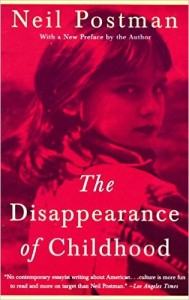I have recently finished reading a very engaging, and prophetic book – ‘the Disappearance of Childhood’ by cultural critic and media theorist, Neil Postman.

First published in 1982, Postman observes the disappearance of the modern notion of childhood, a concept which first arose in the 17th Century. Postman notes the sexualisation of children which was already clearly apparent in the 1970s and 80s (which we are now all too familiar with) and the exponential increase in crime committed by children as some of the more insidious evidence to his claim. But there are other, seemingly less significant things like the disappearance of both improvised games played by children and forms of dress for children which are distinct from adults.
What’s more, with the development of electronic communication, children are no longer shielded from “adults’ secrets” relating to things such as sex, violence and death – a necessity for childhood to exist as it was previously understood. Nowadays, with the advent of the Internet, most children (boys and girls) by around the age of twelve have viewed pornography, and many from a young age become regular consumers.
What is particularly striking and insightful about Postman’s exploration into the disappearance of childhood, is that as ‘childhood’ disappears, so too does ‘adulthood’. Without childhood, there becomes a blurring between the young and the old. Bookending the blurred stage of young and old, we are left with only the truncated stages of “infant” and “invalid”.
A visible example of the disappearance of childhood can be seen in contemporary fashions in clothing. Adults now wear clothes that only children would have worn a generation and a half ago. Furthermore, a raft of middle aged men (and increasingly women) continue to live as if they were still teenagers, or in their early twenties – a life of socialising and entertainment, eschewing adult responsibilities and commitments such as marriage or mortgage. In some cases adults appear to regress, adopting youth fashion in their middle age. Off the back of hipster culture, previously conservative and nerdy men and women have taken to youth culture, adopting for themselves an assortment of tattoos, piercings and youth orientated fashion and interests.
We are now beginning to see the impact of the disappearance of adulthood in our social and political life – this topic I will explore further in my second part.
The disappearance of childhood is a grave tragedy for young people. But more shocking and concerning is its accompanied disappearance of adulthood.










